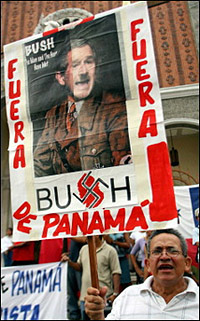 |
 |
 |
 News from Around the Americas | November 2005 News from Around the Americas | November 2005  
Bush Arrives in Panama Carrying Message of Democracy
 AFP AFP


| | A Panamanian shouts slogans against US President George W. Bush during a rally in Panama City. Bush arrived in Panama, with a message of democracy and free trade after a pan-American summit balked at his appeal for quick agreement on a hemispheric free-trade area. (AFP/Teresita Chavarria) |
US President George W. Bush arrived in Panama, with a message of democracy and free trade after a pan-American summit balked at his appeal for quick agreement on a hemispheric free-trade area.

"Panama is an important ally, and they're a nation that we look to, to be a leader for promoting democracy in the region and in the hemisphere," White House spokesman Scott McClellan told reporters on the way to Panama City.

He said Bush and his Panamanian counterpart, Martin Torrijos, will focus Monday on trade and completing a bilateral free-trade agreement between the United States.

The accord is being fashioned after a similar deal reached earlier this year with countries of Central America and the Dominican Republic, which calls for gradual elimination of tariffs and other trade barriers.

McClellan called Panama "an example for the region when it comes to democratic progress" and said Torrijos was committed to strengthening democratic institutions.

Bush and Torrijos were scheduled to have a working meeting and lunch together Monday.

The US president was also to meet with local business and civic leaders, lay a wreath at the American Cemetery and visit the Panama Canal to see the locks.

Before leaving Brazil, Bush ramped up his efforts to curb Venezuela and Cuba's clout in Latin America, accusing them of trying to "roll back" fragile democratic and free-market gains in the region.

Amid concerns in Washington that poverty may enhance the appeal of anti-US, economically populist messages, Bush said in a speech in Brasilia that "ensuring social justice for the Americas requires choosing between two competing visions."

"One offers a vision of hope. It is founded on representative government, integration into the world community, and a faith in the transformative power of freedom," he told student, diplomats and business leaders.

"The other seeks to roll back the democratic progress of the past two decades by playing to fear, pitting neighbor against neighbor and blaming others for their own failures to provide for their people," he said.

Although he never named Venezuelan President Hugo Chavez or Cuban leader Fidel Castro, White House aides tacitly acknowledged that they were the targets of what was the keynote speech of a five-day, three-country trip to the region.

After talks with Brazilian President Luiz Inacio Lula da Silva, Bush bowed to his host's view that successful World Trade Organization (WTO) negotiations have to precede new talks on creating a Free Trade Area of the Americas (FTAA).

Bush and Chavez stayed away from each other at a 34-nation Summit of the Americas in Argentina, where Venezuela and four other countries including Brazil blocked progress on the FTAA.

Brazil has said there is no point in doing so until after the so-called Doha Round of WTO talks, which have bogged down over agricultural subsidies -- the same chief obstacle in the Americas trade debate.

Lula, speaking through an interpreter, called US aid to its farmers "unjustified barriers to our bilateral trade" and that he and Bush had explored their differences "without surprises or confrontations".

In his speech, Bush said that the United States will eliminate US agricultural subsidies but can only do so if other large trading partners agree -- specifically the European Union, which has resisted.

At the same time, Bush pushed his vision of free trade as the best remedy for widespread poverty at a time when the region has swung leftward politically.

US officials have expressed concern about efforts by Chavez to use his country's vast oil wealth to promote an anti-US, populist agenda they fear could appeal to the millions trapped in poverty in the region. | 
 | |
 |



